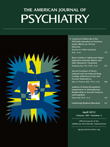Religion/Spirituality and Depression
To the Editor: The editorial by Dan Blazer, M.D., Ph.D., in the January issue (1) deserves commendation for highlighting an important issue we tend to avoid. Depression is a leading cause of disability worldwide, and in light of high rates of insufficient response to antidepressants, nonpharmacological treatment approaches should be more fully explored and implemented.
Dr. Blazer's editorial raises the question of how a psychiatrist should incorporate an assessment of the patient's religion and spirituality into the overall clinical evaluation. Although reimbursement limitations and other practical considerations are typically blamed for the limited discussion of these issues, there may be other reasons as well. Studies have shown, for example, that psychiatrists are less religious and show less religious affiliation relative to their patients or to the population in general (2–4). Omitting an assessment of the patient's religious views and spirituality, however, can result in deeply misunderstanding the patient's values and preferences.
Today we acknowledge that faith, belief, and trust strengthen the backbone of psychological well-being. Religious and spiritual beliefs and values can influence the course of psychiatric disorders. Rapprochement may best be achieved by raising psychiatric awareness and knowledge of the basic concepts of religion and spirituality and by having a willingness to embrace intellectual, cultural, and religious pluralism (5). The need for understanding has never been greater than at present, when our world's very survival is threatened by conflicts associated with the clash of cultures and values.
This article highlights the importance of providing such knowledge to psychiatrists in training. Our patients, our profession, and ultimately our world stand only to gain from such increased understanding.
1. : Religion/spirituality and depression: what can we learn from empirical studies? (editorial). Am J Psychiatry 2012; 169:10–12Link, Google Scholar
2. : Religion, spirituality, and medicine: psychiatrists' and other physicians' differing observations, interpretations, and clinical approaches. Am J Psychiatry 2007; 164:1825–1831Link, Google Scholar
3. : Why do psychiatrists neglect religion? Br J Med Psychol 1995; 68:169–178Crossref, Medline, Google Scholar
4. : Religious characteristics of US physicians: a national survey. J Gen Intern Med 2005; 20:629–634Crossref, Medline, Google Scholar
5. : Religion, spirituality and psychiatry: steps towards rapprochement. Australas Psychiatry 2004; 12:145–147Crossref, Medline, Google Scholar



